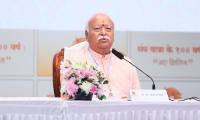Stephen P Cohen, Director of the South Asia Program at the Brookings Institution in the United States said Musharraf's imposition of emergency was "wholly predictable".
Talking to rediff.com, the South Asia expert said he had seen it coming for weeks and had been saying this at several conferences during the past week.
"I had predicted this all of the last week at conferences that there's going to be a martial law declared because they cannot allow Pakistan to go into a period of deeper uncertainty. You had an erratic Supreme Court--doing the right thing, but from the military point of view unpredictable--you had enormous new violence spreading in Pakistan and you actually had Benazir (Bhutto) being criticised by other politicians for doing a deal with Musharraf," he said.
He said this was essentially to pre-empt the Supreme Court Court decision that would have found his presidential candidacy illegal or anti-constitutional.
"But now it could be fully justified in the wake of the raging violence in the last few days, not just in the eyes of the people of Pakistan, but also in the eyes of the Bush Administration that since 9/11 has funnelled several billions of dollars to both fight the war on terrorism and also boost its military," he said.
But Cohen predicted that they are losing Pakistan very quickly and they can't regain it simply by military force alone.
The expert said while the martial law is justifiable in a sense that the army has to get its act together what you could see in fact--one likely event in the future is that Musharraf will turn himself into another Zia-ul-Haq (former military dictator).
Cohen when informed that the Bush Administration was essentially scrambling to get a fix on the situation in Pakistan, said it was largely due to its not having a coherent policy on Pakistan or a well-developed and permanent team of experts on Pakistan within the Administration.
"It was always a top-down policy and we dealt with Musharraf and assumed that he would deal with Pakistan," he said.
"And from day one, the US government mis-estimated his ability to control events in Pakistan," he added, and argued, "Frankly, I haven't seen much in the way of intelligence analysis of Pakistan. We don't have that much expertise in this country because policy was all made on an eyeball to eyeball basis by the President and Musharraf and that's one of the prices you pay when you have highly personalised diplomacy."
Cohen also agreed that it was far too simplistic to think that by Bhutto being injected back into Pakistan--which was engineered by the Bush Administration for all of its denials--it would lead to a transition toward democracy and ultimately the re-democratisation of Pakistan.
"It was desirable, but a naive way of looking at Pakistan," he said, and pointed out that both in the administration and in Congress, those who were cheering the return of Bhutto were the conservatives in sync with the administration.
"The people who were praising her return actually turned out to be a lot of the conservatives who were simply backing the Bush administration," Cohen said.
But Cohen said Muharraf would likely to go ahead with his arangement with Benazir because it's essential to have someone like Benazir in any form of representative government.
He said that of all the politicians "she's the most acceptable in terms of re-orienting the Army against domestic terrorism and in fact has raised this issue strongly and now it's become an issue widely discussed in Pakistan--it was not discussed before while Nawaz (Sharif) had kept quiet about it".
But, Cohen acknowledged that democracy now seemed almost an illusion and noted that "the generals don't want a free election because it would lead to unpredictability--the only free election they ever had destroyed the country".
He lauded India for "behaving responsibly" regarding Pakistan's re-deployment (of troops) from East to West and recalled, "I was in Delhi for two weeks and the Indians understand perfectly well how critically important this is for them and there is nobody in Delhi talking about taking advantage of this and that's a very wise policy."
But Cohen said, "The critical danger is whether Pakistan has passed the point where it can be reconstructed as a normal country, and if that's the case, then we are in for a tremendously difficult decade with Pakistan and with India being a frontline state there, has more to lose in this than any other country, except for Pakistan itself. So it's a big uncertainty I have about Pakistan."








